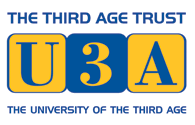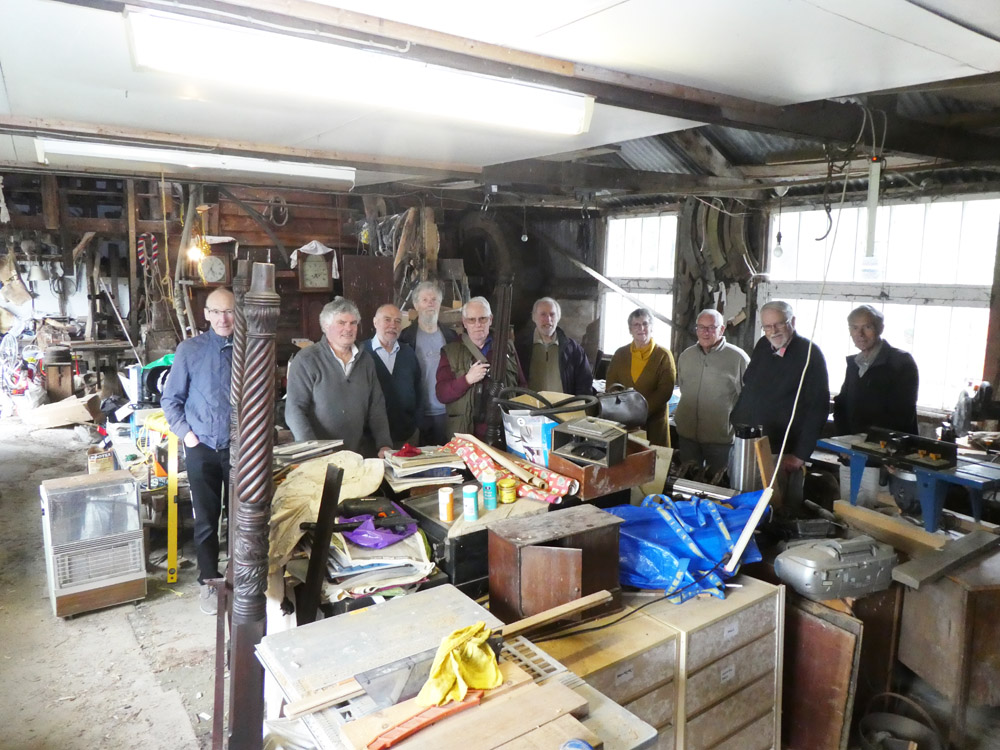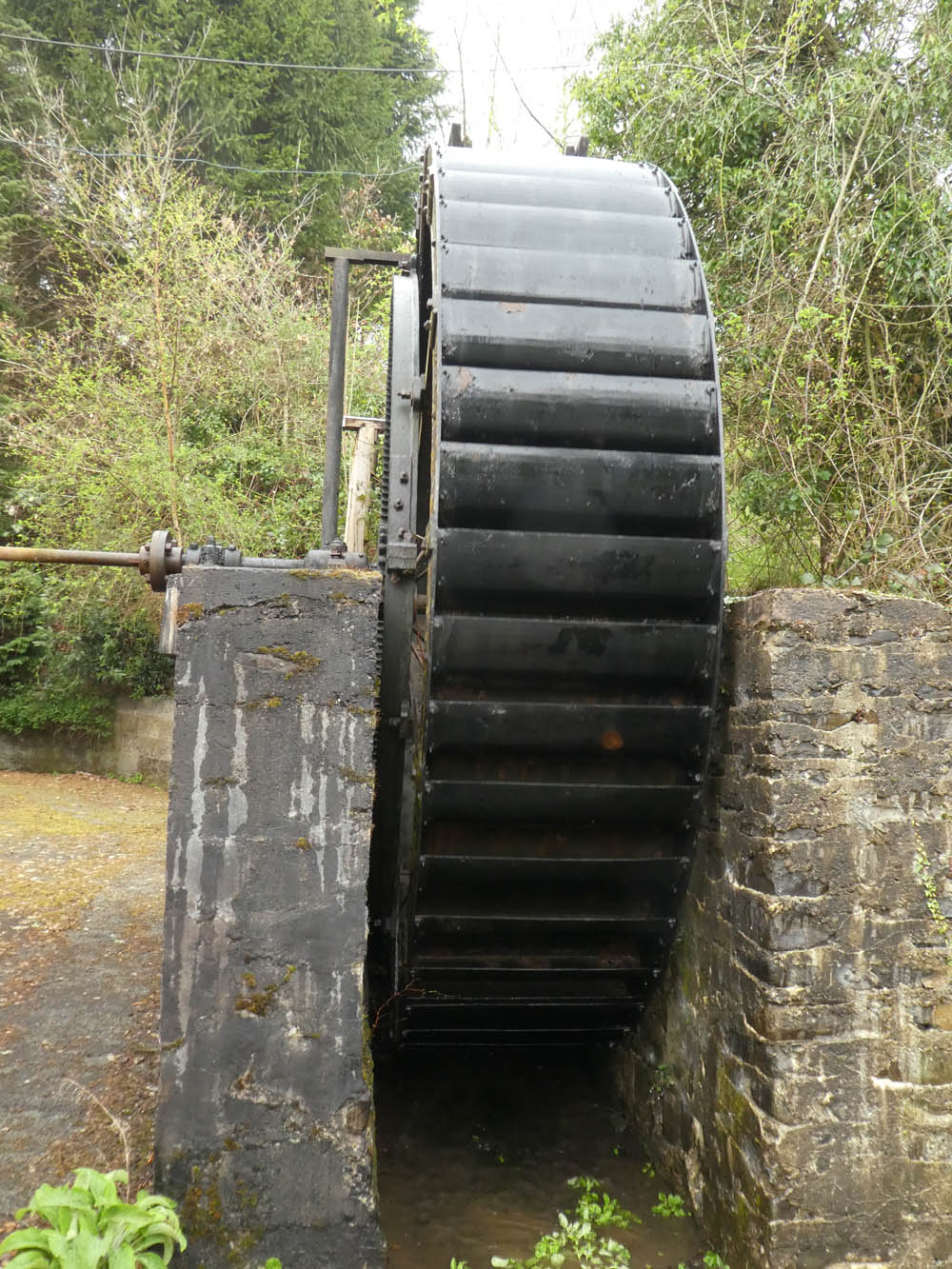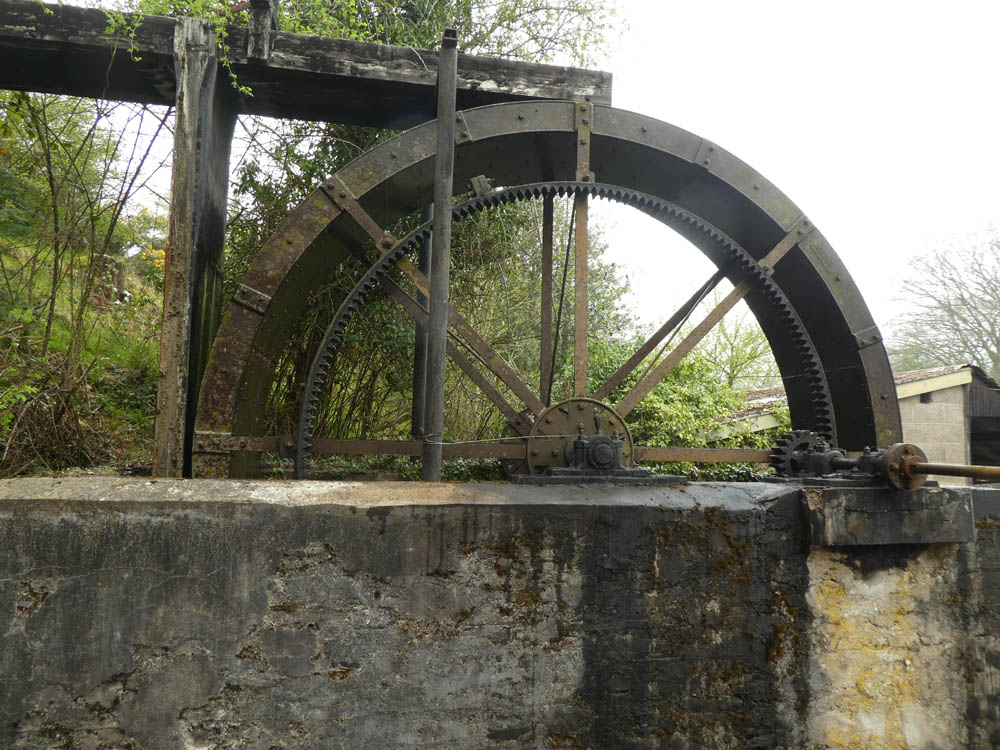|
|
 |
| | Home
| Literary Group | Film Appreciation | Gardening
| Technology
| Walking | Luncheon
Club | MahJong | Environment | Swimming
| Members of U3A are all welcome to join the activities of the groups. Contact details of leaders are given in the Programme of Events. |
|
|
We
define technology in broad terms as 'the application of science for the
improvement of our lifestyle, both historical as well as cutting edge'. If you have an interest or some topic that you would like to know more about, please join us. |
Meetings held Once a month on a Thursday, stariting at 10 am. |
|
The March meeting was held at Mike and Paula's house in Newtown. Nick started the meeting talking about a plan by Aramco to supply ammonia to Japan to use as a fuel in their coal fired power stations. This led to a discussion about the use of ammonia as an easier way to transport hydrogen as a potential fuel. Tim told us about a proposal in the 60's to develop a new town centred on Caersws. This developed from the ideas of Peter Hall who wroite the book 'London 2000' advocating redeveloping the centre of London with high rise building and major motorways going through. Fortunately this type of urban planning, including slum clearance, was mostly resisting. Mike ended the meeting with a longer presentation explaining the production of plastics. These are made from hydrocarbens mostly derived from the fractionation and cracking of oil. Plastics can also be made from natural gas, coal and hydrocarbons produced from biological sources although such bio plastics are not any more biodegradable than those produced from crude oil. Note: the next meeting will be on a Friday (26th April) not the usual Thursday. There are no notes from the December meeting. The January meeting was held at Nick's on January 26th. Tim started it by showing us a tattered, old, sealed envelope that apparently contains seeds sealed in since the 1980's. Tim and his father collected them from a house where they had been since the 1700's. Tim will try to see if they are still viable and talked to us about dormancy. We suggested contacting Kew Gardens. Mike told us about the use of plastic sheeting in farming to warm the soil and control weeds. Some of these plastic products are biodegradable, specified to biodegrade by 90% in 2 years, but biodegradable or not they produce microplastics that end up in the water courses and do not degrade any more. A Dutch study found 48 differenct types of plastic, 61% were fossil fuel based , 39% biobased. Mike pointed our that biobased is not necessarily more environmentally friendly that oil based particularly if they are made from crops, such as maize, spefically grown to turn into plastics. Paula started by telling us the best way to cut carbon emissions. The most effective is have fewer children, followed by living car free. She then went on to talk about how cognitive reserve protects against Alzheimers and other forms of dementia. Cognitive reserve is the term used to describe the way the brain can learn to by pass plaque and tangles in the brain. This can be improved by using your brain more, socializing, higher education, exercise amd diet. Active participation in a group like this technology group is a good activity. Neil talked about the recent use of nitrogen to carry out the execution of a convicted criminal in the USA. Many people have descibed it as inhumane and Neil went on to describe the many methods of execution that are used world-wide. These include lethal injection, doctors will not carry this out for ethical reasons but techicians can and do so. Other methods include electrocution, gas chamber using cyanide gas, firing squad and hanging. The group agreed that none of these methods can be described as humane and execution is so final that mistakes cannot be rectified later. Nick finished the session by telling us about a research project in which aloe vera is being used as a capacitor to store electricity. It sounds like an interesting phenomenon but unlikely to become a practical form of storing electricity. Nick served the usual selection of teas and coffees, some lovely home made lemon cake and other cakes and biscuits.
The next meeting was held at Neil’s
house in Kerry on 23rd Nov Nick started by
noting the New Scientist article reviewing our knowledge of the oceans and the
sea bed as being very short of facts compared with our knowledge of dry land.
The effect of this vast volume and area surface on our environment is still
very little known The Argo project is trying to rectify this by floating out
units traveling in the ocean currents and feeding information on temperature,
salinity etc to scientist worldwide. A lot more is required Tim’s presentation
involved the use of geothermals in swimming pools, particularly, in Buxton and
Matlock where warm springs have been used to heat the water. He has visited
Bath where the water is at 47 C and has to be reduced for the elevated pool
that looks down on the town. Bath Abbey has under floor heating form the hot
springs. Karen talked about Mycoplasm Pneumoniae and its control of infection and, in particular, its effect on Lime’s disease. It has some positive general effects as it scavenges bacteria. A summer break due to holidays, but,
on Oct 26th, we gathered (Neil, Keran, Tim and Nick) at Keran’s
house in Llanidloes. As usual, there was lots of lively discussion on a range
of subjects. In particular, Tim
spoke about his visit to Seattle and the floating bridge across Lake Washington
and its operation in Tidal conditions. Since the Tacoma Narrows suspension
bridge disaster in 1940 which was destroyed by aeroelastic flutter, having a
very significant effect on suspension bridge design, suspension bridge option
for this across water. The Evergreen floating bridge (2350M long and 35M wide)
goes from Seattle East wards and is flexible to allow for tidal and other water
level movements
The meeting in May in the Old Friend's House started with Keran talking about consciousness in relation to animals, in particular octopuses. These intelligent animals have evolved for a similar length of time as humans but ended up quite different. The discussion was about whether octoupuses have consciousness or are reacting automatically to stimuli. The basis of this talk was taken from the book Other Mind by Peter Godfrey Smith. Tim showed us a fascinating series of pictures of a Victorian property that he owns that is infected with dry rot. This is caused by a fungus and needs 20% moisture and a minimum temerature to thrive and can not only spread through wood but also through plaster and lime plaster. It spores annually producing tiny spores that are difficult to deal with. Tim located the source of the problem to a blocked down spout causes water to enter that corner of the house. He's found a partial solution using Roundup. Nick told us about the very ambitious project to put a 12 mile long barrier across the Wash. This would produce electricity but also help control water levels in the Fens. With an estimated cost of £2 billion it is debatable whether it will get built. Nick also raised the topic of hydrogen storage using metal hydrides which seems technically feasible but suitable hydrides need to be identified and some practicail engineering problems overcome. Mike first talked about the study by Harvard and the Sorbonne of 60 paintings of London by Turner and 38 by Monet. This showed the effect of air pollution on their technique from sharp contours to hazy ones. They concluded that 61% variation in contrast was directly due to environmental changes. Mike then went on to discuss several aspects of tyres. Road noise is apparently more of a problem with EVs since the engine noise is now missing. Carbon Air in Manchester have developed an open cell foam from coconut shells that applied to the wheel cavity substantially reduces the resonance and the noise nuisance. Carbon black, used as a filler in most tyres, is derived from coal, coal tar or petroleum products. A method of recovering carbon black from old tyres has been developed and this recovered material can be used to replace about 20% of new carbon black in tyres. Tyre and road wear particles are a major source of air and water pollution and can be damaging to human and animal health. Michelin are developing an airless tyre using encapsulated fibre glass that should reduce pollution from tyre wear. Another approach is to fit electrostatic collectors on cars. The particles collected can be used for shoe soles, new tyre treads and bitument. Finally, some of 1.5 billion waste tyres produced annually in the world can be incorporated into rubberised asphalt road surfaces. There was a meeting in January but we have no records from it. The meeting on April 13th at Nick's house was well attended. It started off with John telling us about a mineral not narurally occurring on earth, only on comets. It is called tetrataenite is composed of iron and nickel and is now able to be manufactured in laboratories. It is ideal for making permanent magnets and will be able to compete with rare earth minerals, mainly coming from China and currently used for permanent magnets. Mike then talked about hydrogen and the need to be able to transport it safely and easily for industrial uses such as in the production of green steel. Hydrogen can be transported as a gas, liquid, as ammonia or as liquid organic hydrogen carriers. Many of these methods are acceptable for short distances, i.e. for use where they are produced, but not for long distant transport. If hydrogen is combined with benzyl tolluene a stable liquid is produced which can be transported by normal liquid carriers. The carrier chemical can be liberated at the use point and returned to the producers for reuse. Tim then gave us a fascinating insight into the effects that the recent very low interest rates are having on the banking industry. At these low rates the banks that use treasury bonds as their guarantee are exposed if their is a run on the banks. He talked about the recent failures in the States and the collapse of the 7th biggest bank in the world, in Switzerland. He predicts that big banks will continue to grow at the expense of local banks. Tim also mentioned that take over of companies like Morrisons by venture capital is an unfortunated consequence of cheap money. Paula talked about the effects of chloresterol and statins on heart disease and strokes and the recent finding that inflamation has a major effect on heart disease and on brain health. The best way to avoid inflamation and stay healthy is to exercise, have a good diet, reduce stress and maintain a healthy weight. Keran didn't have time to present her topic but asked the members to think about it before the next meeting. She asked why there was such a time delay between the development of the eukaryotes which developed at least 2.7 billion years ago and the prokaryotic cells which followed some 1 to 1.5 billion years later. _____________________________________________________________________________________________________ The November meeting at Nick's house was started by Paula explaining the statistics behind the dramatic growth in world population. This is being fuelled, not by birth rate, which is decreasing in many places, but by life expectancy which is increasing virtually everywhere. People are just living longer and in many countries there will be a problem in funding pensions. Tim told us about the Strava Global Heat Map and Nick logged into in on his large tv. This shows that Europe has major human activity, particularly in the Netherlands and that Wales has very little. You can actually focus in to individual streets for example in Newtown. The system is taking data from mobile phones so some places showing low activity are probably showing low levels of mobile phone ownership. Nick talked about the use of an extract from okra to stop bleeding and heal wounds. Aloo also works in a similar way and Nick and Keran asked for plants from Mike. Nick also talked about the progress in nuclear fusion which has been shown to work but there is the major problem of containment. Mike talked about recycling plastic and said that Wales is the 4th best country in the world recycling 52.2% of the plastic used, planning to get to 70% by 2025. Approximately half of all plastic recycled in the UK is incinerated which does produce energy but also lots of CO2 and some dioxins. Again Wales is ahead by of the rest of the UK by banning new incinerators in 2021. The Greek island of Tilos has eliminated the need for landfill by operating a door to door collection and sorting programme for all plastic waste. This is organised through an app provided to all residents and visitors. Finally, Neal talked us through some items from the radio programme Just One Thing. He told us about eccentric exercise in which it is more beneficial to rise from sitting quickly then re-sitting more slowly similarly. Similarly, the exercise benefits of going downhill and greater than going uphill. He also mentioned the beneficial effects of coffee, especially if not drunk first thing in the morning and taking no more than 3 or 4 cups a day. Also eating apples are good for you, especially the skins which contain most of the flovonoids. _______________________________________________________________________________________________________ The October meeting at Mike and Paula's Newtown. The meeting was largely a wide ranging discussion on energy initiated by Tim. The politics and economics of energy and the globalised economy were agreed to be broken. Use of energy locally rather than globally was felt to be a better approach. Mike talked about energy consumption around the world and highlighted the major diffferences in the use of renewables in various country. Nick told us about a web site, Tree Huggers, which compared the cost of electricity storage devices. Everyone enjoyed Paula's delicious apple cake. ______________________________________________________________________________________________________ There have been meetings since May but no minutes have been issued. The meeting in September was at the Old Friends Meeting house, hosted by Tim. The meeting was started by Mike who talked about some exciting new research to produce pure hydrogen from moisture in the air. This removes the need for pure liquid water and works even in arid climates where renewal energy is often more available than clean water. The details of this research can be found at https://www.nature.com/articles/s41467-022-32652-y. Keran then told us about the neurons in our digestive tract, the brain in our gut. This was based on Michael Moseley's book 'Clever Guts'. Their is a mesh of neurons from our throats to our anus which orchestrates digestion and controls body weight and is related to the microbiome. This led neatly on to Paula's talk about diet which emphasised on the bad effects of consuming ultra-processed foods. She also explained the benefits of fasting and the importance of deciding when to eat and the mechanism involved. ____________________________________________________________________________________________________ There was a meeting in April but no notes were prepared, the May meeting at the Friends Meeting House started with the sad news that member, Tony Lake died on 25th April. Paula provided samples of ground elder for the members to cook and try. We then heard about Keran's hot compost bins that some members of the group had seen on a recent visit. They are working well and producing good compost and liquid at temperatures up to 50C. Mike talked about the UK research project aimed at making commercial aircraft carbon neutral by changing construction materials from aluminium and titanium to composites with graphite fibre and metal matrix composites. These approaches will reduce aircraft weight but will need hydrocarbon sources, need energy to produce and are difficult to recycle. Keran showed us the failed key to her 2004 Citroen C4. She has been repairing it over the years but has finally bought an expensive replacement. The group thought that the original key could still be repaired with superglue. Nick told us about geological 'blobs'. These are areas of magma under the Pacific that have diffferent compostion to other materials coming out of volcanoes even though the mantle is global. The theory is that the source was an impact in the early stages of earth's formation and their composition is similar to that of the moon. Nick also recommended a book on the origins of quantum mechanics, "Helgoland" by Carlo Rovelli. Tim told us the fascinating tale of the Coventry Watch Movement Manufacturing Company who made quality pocket watches in the 1800's. They changed their working practices in 1840, standardizing and simplifying but failed to update when America and Switzerland started producing cheaper watches of different designs. Tim drew parallels with industries such as motor bikes, cars and vacuum cleaners. Keran told us about the growth in car clubs, supported by the Welsh Government in which people use communal cars rather than owning individual vehicles. ______________________________________________________________________________________________________ The March meeting was held in our new meeting location at the Old Friends Meeting House, courtesy of Tim. Nick started the meeting with a talk on Long Covid, it's symptoms, causes and mechanisms. It's become very wide spread and persistent and all the members present knew at least one person suffering with it. This led on to a discussion on lung scarring and ways of breathing. Also to yoga and laughing yoga. John followed this with an item of the incredibly energy hungry production of fertilizer, illustrated by a report on the Dangote plant in Nigeria. John told us about developments of fertilizing plants with microbes that are able to convert nitrogen into ammonia after spraying on to the seedling in situ. This is much more efficient, less wasteful and with less risk of contamination of water courses. Keran told us about the health properties of Japanese Knotweed that is used in some countries to treat a number of ailments and conditions. All parts of the plant are effective to some degree and a typical use in Korea, for example, is to treat plaque in dentistry. While most of us knew of the damage the roots of this plant can do to houses and flood defenses, the benefits were news. Tim talked about diet and, specifically, on it's effect on Diabetes. He quoted the UK Government's web site on the subject, Eat Well. This advises a large proportion of carbohydrates, without reference to things like health condition or activity levels. The basis of these recommendations seems to be studies by the food industry. Tim has controlled his diet to reduce sugars and carbs and has successfully reduced his blood pressure and general health. Other countries, such as Germany and Denmark, offer much more focussed advice on diet and health. ______________________________________________________________________________________________________ The meeting in February was at Neil's house in Kerry and was well attended, including a potential new member, Richard. Nick opened the meeting with a suggestion that perhaps members could take a research topic and give periodic, short updates. Most felt that teh current, random contribution by members was a good model and should be continued. Paula gave us a fascinating talk on the new subject of exposomics. This is the study of the effects of external factors such as pollutants, chemicals, particles, etc on our health and longevity. This is part of the Human Genome project. It engendered a lively debate on such things as micro plastics, small particle air pollution and asbestos. Rod told us about the history and current state of the electric vehicle use. He talked about the problems of cost, lack of charging points, possible shortage of electricity and the need for rare earths in their construction. Tim gave a summary of the current state of money and finance. He noted that for centuries a fair interest rate for both lender and borrower has been 5%. The artificially low interest rate we currently have has been caused by governments printing money leading to inflation and excessive investment in property. We also talked about the role of gold and Bitcoins and the burden of death duty. Mike followed on from Rod's talk on EVs and talked about the use of rare earths in electric motors and batteries. Heavy rare earths are very expensive, in short supply and environmentally damaging in their extraction and refining. Car manufacturers are exploring alternatives that do not need rare earth metals but so far they are less efficient. Nick talked about the use of hydrogen for energy production. There are processes that produce hydrogen by hydrolysis of water using renewable energy when available, storing the hydrogen then using it to produce electricity when needed. It was agreed by all that the challenge of electricity production needs serious, targeted investment by governments. ______________________________________________________________________________________________________ The December meeting was at Mike and Paula's house in Newtown and was well attended. Keran started the meeting with a description of compost toilets based on the book about a low impact roundhouse by Tony Wrench. The use of compost toilet is good for the environment on a number of levels, not for everyone but could be used more. Nick followed with a description of the way that the formulation of cement is being changed to make its production less carbon intensive. The replacement of fly ash by such things as kaolin or volcanic ash reduces the heat needed to produce cement while producing an acceptable product. Time, a water mill owner, told us about a company, Rotorheat, who have developed technology in which the rotation of a water wheel could be used to produce large quanttities of heat. With all the streams in Wales it is technology that could be used for cheap local home heating. .Mike talked about the use of renewable energy around the world and the way that some countries, fro example Norway are producing the majority of their energy from renewable sources. The UK is doing reasonably well with wind but has phased out the use of coal in power stations to be replaced by heavily subsidised imported wood pellets at, for example the Drax station. Paula finished the meeting by telling us about the latest thinking on the start of the Covid pandemic. The current view that it did origiinate at the Wuhan market not by some release from a laboratory. The break during the meeting included tea and coffee with some
of Paula's excellent rhubarb cake. This started a discussion on
cake and the use of stored or frozen fruit. The November meeting was held in the old Friends Meeting House in Newtown, hosted by Tim. Thid delightful old building was moved from Dolgellau years ago and is reputed to have been one of Owain Glyndwr's parliament buildings. Rather appropriately the first talk was by Tim who discussed wood burning fires and stoves. He described the reports of the dangers of wood burning due to micro particle emissions. There is little scientific basis or evidence for this concern. If wood burners are properly used with suitable timber they are unlikely to cause harmful emissions. Paula then talked about the changes that have occured in humans over the last 100 years. Humans now are taller, fatter and live longer, with notable geographical variations. These changes are due to medical, cultural and technological innovations. This fascinating presentation led to some lively discussions on nutrition and diet including the micro biome and the information available on the Zoe web site. Mike then talksed about the total cost of ownership of electric vehicles compared with internal combustion ones. This comparison is strongly influenced by taxes, subsitied and the cost of petrol and electricity. A 2021 study in Europe, USA and Asia by the Nickel Institute concluded that smalll and medium electric vehicles are cost competitive with conventional vehicles in all the areas studied. Luxury vehicles often do not have lower total cost of ownership, depending on the country and mileage travelled. Kieran discussed the possibiliy of installing a highly efficient composting system in her cellar and piping the heat generated around her house. While this sounded an attractive proposition the group raised concerns about the generation of potentially dangerous CO2 and methane gases. Maybe safer to install out of doors and pipe the heat in. We ran out of time at that point, Nick and John will start the next meeting. The July meeting was held in the garden and conservatory at Nick's house on a glorious hot day. Tim started the meeting by telling us about gain on function which describes the process of adding features on to a virus to enable it to pass to other species. This process was apparently being researched at Wuhan so led to speculation about the source of the Covid pandemic and a discussion about Chinese objectives in the world. Rod gave us a summary of the fitting and use of stents to deal with blocked arteries around the heart. Nick raised the subject of quantum computing and talked about the increased power it will provide in, for example, interpretation of medical scans. He also told us about his electrical car, solar panels, heat pump, battery and smart meter technology. He has spent a lot of money on this installation but now has a very cheap to run house. Mike told us about an Italian project that is making 60 square metre houses by 3D printing a slurry of local mud. He also talked about the problems of plastic particles in the ocean, some derived from tire wear on the roads but a lot coming from the use of old tires in fishing. Also much derives from lost or discarded fishing nets, pots, etc. which make up 46% of the 79,000 t of plastic in the Great Pacific Garbage Patch. Developments are under way to use other polymers for these items to make them biodegradable. Paula ended the meeting by talking about solar flares and the
effect they can have on satellites, power systems, communicationes, etc
and the effect a large flare would have on all aspects of modern life.
There is a solar observatory in the US that is monitoring sun
activity with the intention of predicting dangerous flares
giving perhaps 18 hoursnotice to allow the shuting down of
satellites and electrical distribution networks, liable to be damaged.
Paula also expressed the view that at future meetings
participants should come with prepared short presentations rather than
topics for discussion. The group agreed that we would revert to
this original format. After a long period without meetings we held an outdoor one today, 24th June. This was suggested by Keran and was held in her garden in Llanidloes. Nick started the meeting with a vote of thanks to Keran for suggesting a meeting and providing the venue. Keran talked about the Fermi Paradox which is about the lack of evidence of extraterrestial life and the Drake equation which calcullates the number of likely planets with life on them. Paula gave us a topical talk on the changing face of the Covid virus. She told us of the survey work done using the ZOE app which collects data from as many people as possible. They have found that the symptoms have changed with the delta variance and now resemble the common cold. Paula suggests that we all sing up for the ZOE app to increase the data size and get updates on this virus. https://covid.joinzoe.com/ Mike talked about the use of hydrogen for trains. Trains are a more likely candidate for hydrogen propulsion since, unlike cars, they have central depots, defined routes and are big enough to carry stores of hydrogen. While hydrogen is more expensive than electric of diesel propulsion it is a good option for mainline trains. A hydrogen train developed by the University of Birmingham has completed mainline trials and is due to go into service soon. Tony posed the question 'is our species likely to survive?' He said that AI, gain of function and global warming represented a serious threat to our long term survival. The group agreed that survival is unlikely but not necessarily due to the reasons listed by Tony. Tony suggested that gravity would be a suitable topic to explore at a future meeting. Nick started a discussion on hydrothermal vents. These are the deep sea vents where lifeforms exist that do not depend on energy from the sun, as on land, but instead use sulphur from the vents to maintain life. We speculated whether the early life forms on Earth might have been similiar or, indeed, used other elements as an energy source. The group decided to hold another meeting in a month's time at Nick's house. In March we met at Tony's house. Tim started the meeting with a fascinating explanation of dry rot in buildings. He illustrated it by describing the situation in a house in Welshpool which had been insulated and effectively sealed to conserve energy which caused a major damp problem leading to extensive dry rot attack. Tim mitigated the problem by removing all the damaged materials and ensuring an adequate air flow through the underfloor and affected walls. Ralph told us about the seasonality and the effect on the timing of the seasons caused by the tilt of the earth. He also talked about the molecule in plants, called Messenger RNA, that react to the length of daylight and affect the formation of buds and flowers.. Tony told us about an interesting project that he had been involved in that involved putting 2D or 3D images inside blocks of glass using by pulsing and focussing a laser. Tony had bought machines to make these items but found that they were not commercially viable. They are interesting and unusual objects though. Nick finished the meeting by talking about meat being cultured from muscle cells to produce an alternative to meat from living animals. Another interesting investigation, one that produced a $300,000 hamburger in Holland in 2013 but not curently practical. Research continues to find an acceptable alternative to conventional meat.__________________________________________________________________________________________________ The December meeting was at Neal's house in Kerry. We talked about the UK steel industry and the new technology that is keeping it alive; organic food production and vegan diets; planet number 9 that is thought to be out there but has yet to be detected; and heat pumps both air and ground types. Inevitably, since this was election day, we also talked some politics. The
November meeting at Mike and Paula's welcomed a new member, Karen
Simms. We started with Karen telling us about her background in
various science subjects and her interest in envivonmental issues.
She is particularly interested in the efficient home heating
method of rocket mass heating (see
https://www.youtube.com/watch?v=fwCz8Ris79g ). She also
talked about a neighbour who is conducting experimental archaeology
by setting up a neolithic homestead. The group would like to
visit this at some future date. The rest of the members present
gave a short summary of their backgrounds and interests. Nick
gave us a talk on flying rivers, the name given to the phenomenon of
transpiration of moisture from trees and forests and being
distributed by the atmosphere. It has been calculated that this
form of distribution of water is more important than movement of the
oceans. It is also possibly a more important reason to
prevent deforestation than its effect on climate change. In September we went to CAT in Machynlleth on a nice sunny day. We enjoyed the visit but were a bit disappointed that a lot of the technology is rather dated and not very advanced. It was still nice to do the walk up to the old quarry and have a good lunch in the cafe there. Some of the hands on displays were also amusing and informative. 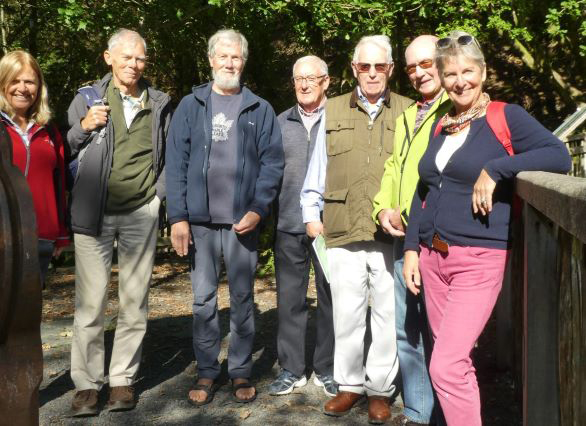 The June meeting was at Sheena's very interesting house at Bontdolgadfach. Most of the meeting was taken up with a lively discussion on environmental and climate issues as a basis for setting up an action group within the Newtown U3A. Tony is willing to lead such a group and has already contacted similar groups in other U3A branches. There was general agreement that this is a good idea and Nick will circulate notes to the Tech Group as a starting point. We also had an interesting talk by Norman on the methods being used to generate hydrogen which led to a discussion on the feasibility of using hydrogen to fuel vehicles. The April meeting was a fascinating visit to Tim's in Pontolgach to see the working water mill which still provides power to the original wheelrights/carpenters workshop. Tim demonstrated how the mill works and showed us around all the original features of the house, workshop and mill. He also showed us a hand made copy of an early motor car that he bought from the maker. It looks lovely but is not easy to drive without power steering or syncromesh gearing. Tim's enthusiasm was infectious and we all got a great deal of pleasure from the visit. The rest of the meeting was taken up with a presentation Nick on the amazing migration of the Painted Lady butterfly from Britain to the Saharah and the return by their offspring by a different route. Tony talked about the development of planes and space craft, highlighting the problems that have been encountered. He left us with the question of whether we think driverless cars should be controlled by computer or by drivers with computer back up. Finally Paula gave us a summary of the gender gap in Science and Technology where women are disadvantaged from the beginning to the end of their career. This provoked a lively discussion, split largely along gender lines. Freshly made refreshments were provided by Sheena.
The March meeting at Alan's started with an introduction to new member Norman Simmonds who gave us a brief summary of his working background. Starting as an electrician he eventually became involved in control technology living in the US for some years and travelling worldwide. The first talk was by Alan on the cheery subject of smallpox which has officially been eradicated . The last death was of a medical worker who was exposed in a medical lab in Birmingham. This medical technician was a friend of Sheila who was working in the same lab at the time. Tony told us about the possible dangers of theft of keyless cars and recommended that anyone with such vehicles keep their keys in a Faraday box. He also talked about other innovations coming such as automatic speed control. Paula talked about the 5G mobile phone system which is being developed. It has a number of advantage, such as speed, but will need more low level transmitters and won't be able to penetrate walls. Nick told us about the techniques being developed or tested to deal with drones flying near airports. The most promising one he menioned was a defending drone fitted with a capture net. No agreed answer has yet been found so while many airports have banned drones enforcement is a problem. Mike talked about black boxes on aircraft, topical given recent crashes. They are now greatly improved and can monitor many more factors on an aircraft and analog recording is now used to replace the original tape recording. While they are not indestuctible they can withstand severe exposure to pressure, impact and heat. The meeting finished with each member giving a short summary of their working backgrounds for the benefit of the new member but also as a useful reminder to the rest of the group. The
February
meeting was at Ralph's house and was very well attended. We only
managed to cover three topics though, since each provoked lots of
discussion. First was Tim who told us fascinating things about
clocks and clockmaking illustrated with a reproduction 16th C lantern
clock. Mike then went through a report from Policy Horizons
Canada which described developments in energy technology in the
categories of storage, smart grid and generation. Paula finished
with a report on the way we are all being manipulated by social media
and the difficulties of detecting fake news. Ralph served the
excellent scones, thoughtfully pre-buttered for us. All together
a pleasant and enlightening morning. Five of us made it through the mist in November to visit the
River Simple
factory in Llandrindod Wells and had a very instructive visit to he
works and office of this innovative company. For ten years, they have
been
designing and building concept cars driven by Hydrogen fuel cells and
we were guided
by very enthusiastic managers who talked about the future of the
hydrogen
economy with its zero pollution. The car they have working at the
moment can travel at 60 mph and 300 miles on a tank full of hydrogen.
Unfortunately the limitation is fueling points which
are nowhere close to us in mid-Wales. 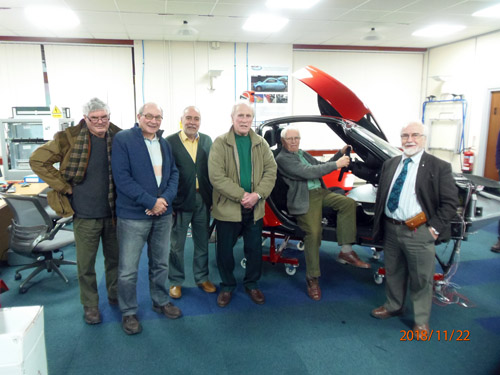 In October we met at Tony's house in Van. Tony started the meeting by talking about hydrogen fuel cells in connection with transport. The Hydrogen Council has an aim to get transport decarbonised by 2030 and a number of companies are actively looking at hydrogen fuel cell cars, including the local company River Simple, due to be visited by the group next month. Paula talked about the energy requirements of some of today's technology, particluarly artificial intellingence devices and computers. Computers use an estimated 5% of generated power world-wide. Mike talked about global warming and the UK government's plan to hold a Green GB week to celebrate the UK's achievements in tackling global warming. But, while CO2 emissions are falling in the UK emissions from transport have increased by 4% since people are buying bigger cars since the fuel duty incentive for low pollution hybrids has been removed. The plan for zero carbon homes has been scrapped and home insulation and solar panel grants have also been removed. The government is still also supporting expansion of Heathrow. It seems likely that the global warming target of 1.5 or 2C will now be missed and a new target of 3C is likely. At this increase in temperature many areas of the world will flood and many millions of people will have to relocate. Nick talked about the vast sums of money being spent in London, particularly on the new London Bridge station. The group agreed that the money spent in London should be more evenly spent across the country. Ralph talked about the new Hong Kong to Macau bridge, the longest in the world. Part of this road traffic route is a sub sea tunnel to allow shipping to enter the Pearl River delta. The driving time will be only half an hour. TheSeptember meeting in Newtown followed the usual short presentation format. It started with Alan giving us some startling facts about livestock farming for meat and the adverse effect this can have on the environment and availability of land for other crops. Some land, of course, is best suited to sheep farming but the general point is that meat eating will have to be drastically reduced in the future. Ralph told us about the amazing role played by carbon in life and it's formation by fusion reactions with hydrogen in the stars. Without carbon and oxygen, life would not exist. Mike talked about the progress that has been made in harnessing fusion reactions on earth for power. There are still many obstacles to be overcome but many countries have shown the feasibility of producing electricity from fusion of deuterium and tritium, largely brought about by improvements in magnet materials. Tony warned of the potential dangers of smart tvs. These are the only type of tv that will be available soon and although the multiple suppliers all have different technology they all will be able to access more information about the user than the current internet. Topics previously discussed:
|
|
| Links: Welshpool U3A The Virtual U3A (vU3a) | |
